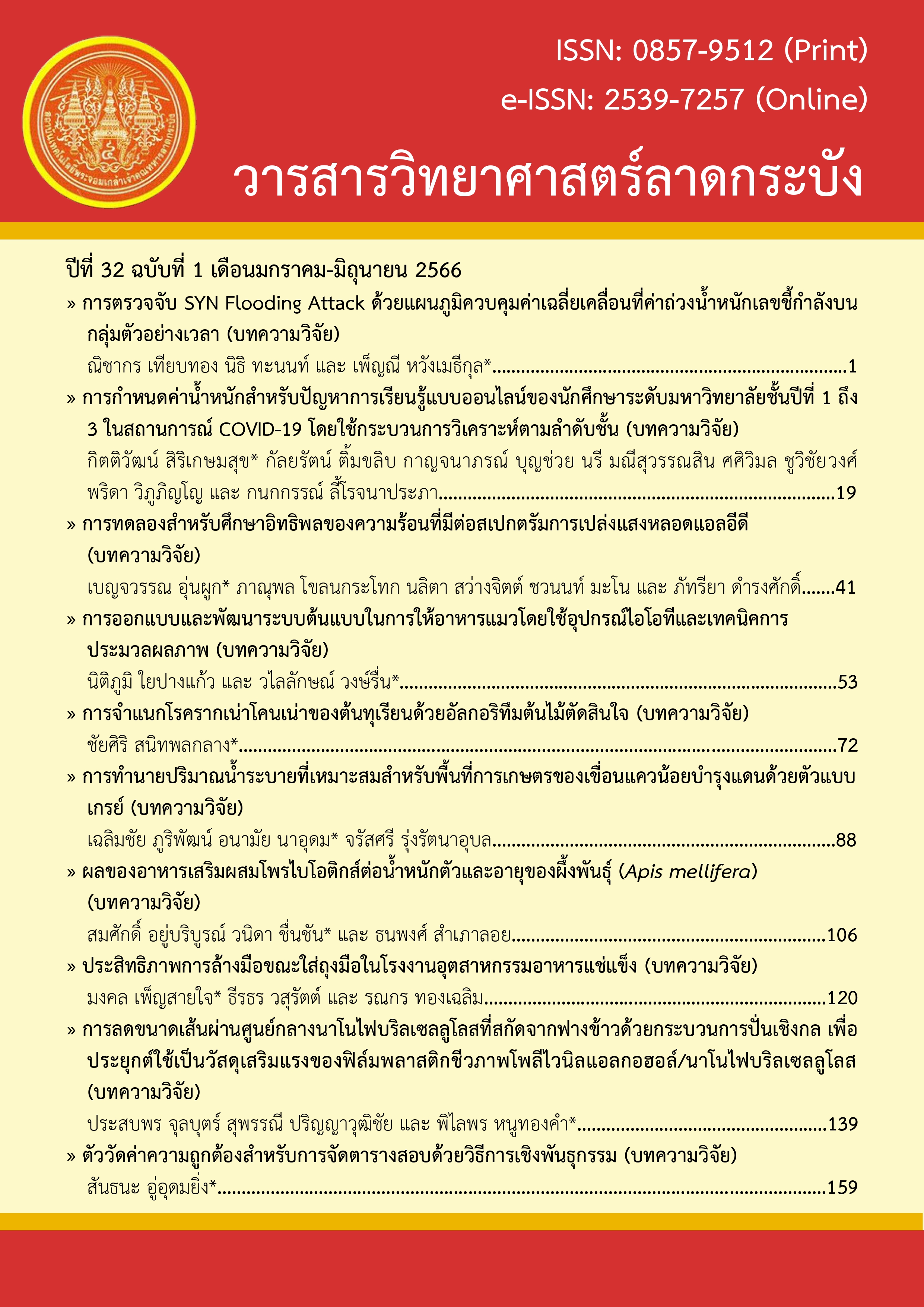ตัววัดค่าความถูกต้องสำหรับการจัดตารางสอบด้วยวิธีการเชิงพันธุกรรม
Main Article Content
บทคัดย่อ
วิธีการเชิงพันธุกรรม (Genetic Algorithm) เป็นขั้นตอนวิธีที่เหมาะสมกับปัญหาการจัดตารางการใช้ห้อง ขั้นตอนวิธีนี้คำนวณหาผลลัพธ์จากเงื่อนไขของปัญหา ซึ่งเป็นข้อได้เปรียบเหนือกว่าการใช้แบบจำลองการเรียนรู้ของเครื่องแบบที่ไม่สามารถอธิบายที่มาของผลลัพธ์ได้ วิธีการเชิงพันธุกรรมดำเนินการหาลำดับของยีนที่สอดคล้องกับเงื่อนไขเพื่อคำนวณหาค่าความถูกต้อง (Accuracy) ปัญหาปริมาณเวลาที่ต้องใช้ในการประมวลผลเป็นเรื่องของการเข้ารหัสโครโมโซมให้เหมาะกับการคำนวณเพื่อเพิ่มประสิทธิภาพในการประมวลผล บทความนี้กล่าวถึงการออกแบบตัววัด เพื่อหาค่าความถูกต้อง และค่าประสิทธิภาพการใช้เวลาของผู้สอบ สำหรับใช้กับปัญหาการจัดตารางสอบการนำเสนอวิชาปัญหาพิเศษของนักศึกษาชั้นปีสุดท้าย ตารางสอบที่ได้ปราศจากจากความขัดแย้ง กล่าวคือ ไม่มีความขัดแย้งของเวลาที่กรรมการต้องดำเนินการตรวจการนำเสนอของนักศึกษา นอกจากนี้ ตารางสอบที่ได้ยังตอบสนองในด้านระยะเวลาที่ใช้ในการดำเนินการสอบ ค่าประสิทธิภาพการใช้เวลาหมายถึงการหาค่าจำนวนวันที่น้อยที่สุดที่ต้องใช้ เพื่อนำไปคำนวณหาขอบเขตบน และล่างของค่าความถูกต้องของตารางสอบ
Article Details

อนุญาตภายใต้เงื่อนไข Creative Commons Attribution-NonCommercial-NoDerivatives 4.0 International License.
เอกสารอ้างอิง
Katoch, S., Chauhan, S.S. and Kumar, V. 2021. A review on genetic algorithm: past, present, and future. Multimedia Tools and Applications, 80(5), 8091-8126.
Gomez, F.J. 2003. Robust non-linear control through neuroevolution. The University of Texas at Austin.
Chen, R., Yang, B., Li, S. and Wang, S. 2020. A self-learning genetic algorithm based on reinforcement learning for flexible job-shop scheduling problem. Computers & Industrial Engineering, 149, 106778.
Borumand, A. and Beheshtinia, M.A. 2018. A developed genetic algorithm for solving the multi-objective supply chain scheduling problem. Kybernetes.
Khelifa, M., Boughaci, D. and Aïmeur, E. 2020. A new approach based on graph matching and evolutionary approach for sport scheduling problem. Intelligent Decision Technologies, 14(4), 565-580.
Chen, M.C., Goh, S.L., Sabar, N.R. and Kendall, G. 2021. A survey of university course timetabling problem: perspectives, trends and opportunities. IEEE Access, 9, 106515-106529.
Jha, S.K. 2014. Exam timetabling problem using genetic algorithm. International Journal of Research in Engineering and Technology, 3(5), 649-654.
Tan, J.S., Goh, S.L., Kendall, G. and Sabar, N.R. 2021. A survey of the state-of-the-art of optimisation methodologies in school timetabling problems. Expert Systems with Applications, 165, 113943.
Almeida, M.W.S., Medeiros, J.P.S. and Oliveira, P.R. 2015. Solving the academic timetable problem thinking on student needs. In 2015 IEEE 14th International Conference on Machine Learning and Applications (ICMLA) (pp. 673-676).
Raghavjee, R. and Pillay, N. 2013. A study of genetic algorithms to solve the school timetabling problem. In Mexican International Conference on Artificial Intelligence (pp. 64-80). Springer, Berlin, Heidelberg.
Sutar, S.R. and Bichkar, R.S. 2016. Genetic algorithms based timetabling using knowledge augmented operators. International Journal of Computer Science and Information Security, 14(11), 570.
Budiono, T.A. and Wong, K.W. 2012. A pure graph coloring constructive heuristic in timetabling. In 2012 IEEE International Conference on Computer & Information Science (ICCIS), 1, 307-312.
Avella, P., Boccia, M., Viglione, S. and Vasilyev, I. 2019. A local branching MIP heuristic for a real-world curriculum-based course timetabling problem. In International Conference on Mathematical Optimization Theory and Operations Research (pp. 438-451). Springer, Cham.
Habashi, S.S., Salama, C., Yousef, A.H. and Fahmy, H.M. 2018. Adaptive diversifying hyper-heuristic based approach for timetabling problems. In 2018 IEEE 9th Annual Information Technology, Electronics and Mobile Communication Conference (IEMCON), 259-266.
Sze, S.N., Bong, C.L., Chiew, K.L., Tiong, W.K. and Bolhassan, 2017. Case study: University lecture timetabling without pre-registration data. In 2017 International Conference on Applied System Innovation (ICASI) (pp. 732-735).

